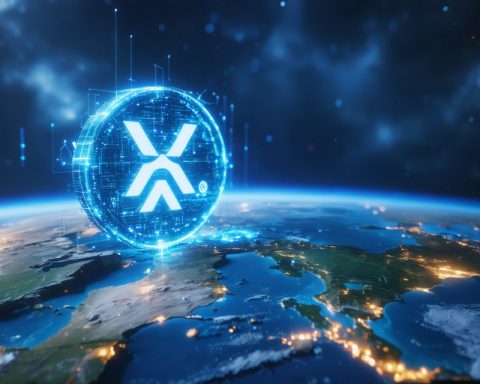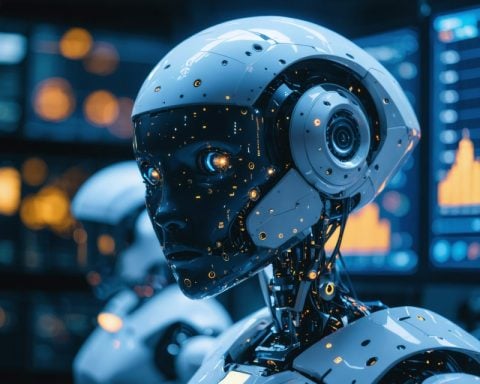The year 2024 was a game-changer for the tech world as Silicon Valley’s fierce artificial intelligence (AI) competition drove Apple to an astounding $4 trillion market valuation. This transformation fundamentally altered how tech giants conduct business.
Apple’s AI Leap
In a bold move away from its usual cautious pace, Apple saw its stock surge by 16% late in the year. The buzz was driven by the introduction of AI-enhanced iPhones, showcasing smarter Siri capabilities and powerful photo-editing tools. Investors were thrilled, seeing AI as the fuel for the next major wave in consumer electronics.
Meta’s Vision for a Reinvented Future
Meta, however, took a different path, channeling efforts into its AI-powered Ray-Ban smart glasses. CEO Mark Zuckerberg aimed to redefine daily tech interactions, envisioning these wearables as potential smartphone replacements. With augmented reality at its core, Meta’s ambitious move represented its biggest hardware push since launching the Quest virtual reality headsets.
Alphabet’s Quantum Leap
Alphabet dazzled with Gemini 2.0, its most sophisticated AI model yet, along with breakthroughs in quantum computing innovations like the Trillium AI chip. These advancements positioned Alphabet as a frontrunner, promising to revolutionize areas from cloud computing to autonomous systems.
Nvidia’s Expanding Influence
Nvidia solidified its dominance in the AI arena with new hardware like the Blackwell B100 and B200 GPUs, enhancing generative AI capabilities. The release of the affordable Jetson Orin Nano Super Developer Kit expanded AI access, making waves across industries like healthcare and automotive.
Wider AI Adoption
AI’s impact extended beyond Silicon Valley, revolutionizing sectors like defense, healthcare, and finance. Companies embraced AI for everything from logistical optimizations to predictive maintenance, signifying AI’s newfound role as a cornerstone of modern business strategies.
As AI transitions from innovation to an essential business driver, 2025 will test the industry’s ability to sustain this growth. The march towards an AI-driven future is well underway, reshaping the technological landscape irreversibly.
How the AI Revolution of 2024 Set the Stage for 2025 and Beyond
The year 2024 marked a pivotal shift in the technological landscape, especially with the acceleration of AI advancements. Spearheaded by tech giants like Apple, Meta, Alphabet, and Nvidia, the AI revolution has set the stage for significant changes across industries. Here, we explore the key innovations, market dynamics, and potential future trends that emerged from this transformative period.
AI Innovations and Breakthroughs
Apple’s AI Leap: Remarkably, Apple broke from its typically cautious approach to adopt more aggressive AI integration strategies. With AI-enhanced iPhones, including smarter Siri and advanced photo-editing features, Apple significantly boosted its market value. Observers anticipate further AI-driven innovations in Apple’s product line, possibly incorporating augmented reality and machine learning features into everyday consumer technology.
Meta’s Augmented Reality Ambitions: Meta’s focus on AI came with the launch of AI-powered Ray-Ban smart glasses. These devices aim to transform the way users engage with technology, positioning wearables as potential successors to traditional smartphones. As augmented reality continues to evolve, Meta’s venture could significantly influence daily tech interactions and application development.
Alphabet’s Quantum Advancements: Alphabet unveiled the Gemini 2.0 AI model and made strides in quantum computing with the innovative Trillium AI chip. Their technology promises significant implications for cloud computing and autonomous systems. Industry analysts expect Alphabet to lead breakthroughs in AI applications ranging from data processing to advanced algorithm development.
Expanding AI Influence and Market Dynamics
Nvidia’s Generative AI Power: Nvidia has continued its dominance in the AI sector with the introduction of the Blackwell B100 and B200 GPUs, which enhance generative AI capabilities. The release of the cost-effective Jetson Orin Nano Super Developer Kit democratized AI, making it accessible across various sectors such as healthcare and automotive. This movement showcases the potential for wider adoption of AI technology.
Adoption Across Industries: AI is no longer confined to tech-centric organizations. It has started revolutionizing sectors including defense, healthcare, and finance, through applications like logistical optimization and predictive maintenance. Industries are now re-evaluating their strategies to incorporate AI as a crucial component of operations.
Predictions and Future Insights
As we move into 2025, sustaining the growth from AI is critical. The widespread adoption of AI technologies is anticipated to continue reshaping business operations and consumer interactions globally. Tech companies may also face challenges related to security, privacy, and ethical considerations surrounding AI implementations. Leading companies could potentially set new standards by integrating ethical AI practices, further influencing industry regulations.
Market Analysis and Competition: With AI platforms becoming more sophisticated, competition among tech giants is expected to intensify, prompting a wave of innovations and potential collaborations. Companies like Apple, Meta, Alphabet, and Nvidia are likely to lead the quest for cutting-edge AI applications, which might increasingly cross over into areas like environmental sustainability and education.
Overall, the AI revolution of 2024 acts as a precursor to a future where AI becomes an integral part of technological advancement, fostering a more connected and intelligent world. As AI technologies evolve, staying ahead of market trends and pioneering innovative solutions will be vital for companies aiming to thrive in this dynamic era.

















